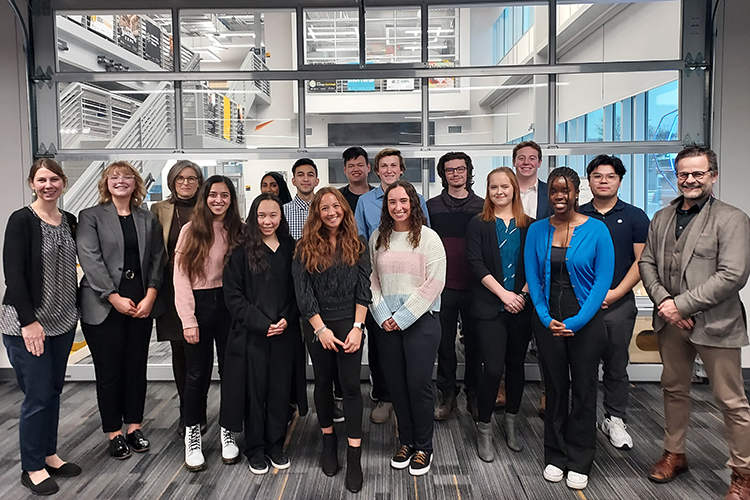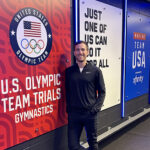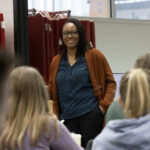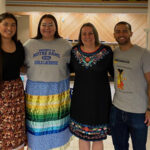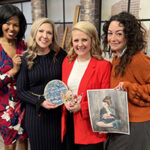A new partnership between UW-Milwaukee and the Medical College of Wisconsin Cancer Center is paving the way for undergraduate students to gain experience on the frontlines of cancer research.
The MCW Cancer Center and UWM Undergraduate Research Program wrapped up its inaugural year as students in the program finished their summer research in the MCW Cancer Center labs. The collaboration is designed to train a new generation of researchers by pairing classroom training with hands-on experience as students work alongside mentors from the Cancer Center.
“We want to identify and empower the next generation of career cancer researchers who will be the ones to make the next major breakthroughs in discoveries and therapeutics,” said Michele Battle, one of the program’s co-creators.
In the beginning
The partnership grew out of a conversation between UWM Chancellor Mark Mone and Gustavo Leone, the director of the MCW Cancer Center, as the two discussed ways the institutions could collaborate. For Mone, who was diagnosed with non-Hodgkins’s lymphoma in 2020, enabling students to engage in cancer research seemed like a natural fit.
So, Mone approached Kyla Esguerra, deputy director of undergraduate research at UWM, to set up the partnership on the university’s side. Leone handed the same task to Battle, a professor of cell biology, neurobiology and anatomy at MCW.
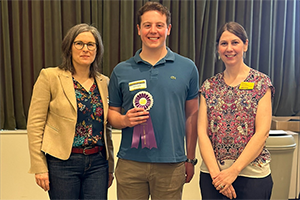
Together, Battle and Esguerra built a program that is meant to provide students with a long-term research experience at the hands of accomplished mentors who can guide them on their career paths.
“Our goal is to provide them with a longitudinal experience so that they are integrated and working in cancer labs early during their time at UWM,” Battle said. “We want them to continue in those labs through the time that they graduate.”
That’s important, she added, because while standalone research programs are enriching and give students valuable experience, they often focus on technical training, rather than allowing students to delve deeply into the work.
“We encourage the students, from the start, to become very intellectually engaged in the research project,” Battle said. “We want them to understand what the project is about, why it is important, how it is going to impact cancer research, and how it is going to impact how we care for patients or design new drugs.”
But to do that, Esguerra realized that the students needed to learn how to do research.
In the classroom and the lab
So, the program is designed to start with a seminar class, co-taught by Battle and Esguerra, for any student interested in taking part in the program. They drew students from several disciplines across the university, including public health and psychology, though most are majors in the natural sciences or on the pre-med track. Research experience was a plus, Esguerra noted, but not required.
The class focused on the basics of research: How to identify a line of inquiry, write a proposal, and apply for grant funding, among other skills. The students were paired with mentors at the MCW Cancer Center to work on existing projects so they could gain a deeper understanding of the skills and science behind various aspects of cancer research. At the end of the class, the students presented their research proposals before a committee of experts, including Mone and Leone.
“(The students) just blew them away. It was really spectacular,” Battle said.
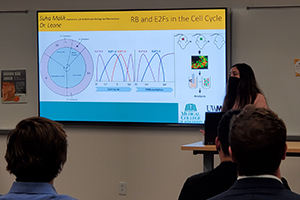
Based on their submissions, 10 of the students were awarded a $10,000 scholarship to participate in a summer fellowship to advance their research projects alongside their mentors at the MCW Cancer Center.
Florin Saitis and Suha Malik smiled with delight when they heard they were chosen for the summer fellowship.
“It seemed daunting at first, since it involved research into something as significant as cancer,” Malik said. “Although I had been involved in research at UWM, I felt that, as a pre-med student, and as someone who envisions herself in the health care field in the future, this MCW Cancer Center/UWM joint program would provide unparalleled opportunity to become involved in research centering around health care.”
Malik and Saitis, both biology majors, are two of the 10 students chosen to receive fellowships. Saitis worked under the guidance of Blake Hill, a professor of biochemistry at MCW, and Malik was mentored by Leone.
Both students say the classroom seminar and the proposal presentation were intimidating but rewarding.
“The mentorship and the support that we received, not only from our MCW Cancer Center mentors but also Kyla and Dr. Battle, really guided us,” Malik said. It also prepared them to present their work at the UWM Undergraduate Research Symposium in April.
Saitis said that he appreciated the camaraderie that the cohort built, and the experience he gained. Spending time in the lab was a fun challenge, he added.
“Learning to work with PhD students and research scientists, learning a lot of different lab techniques, and seeing the variety of things that can be accomplished at a research lab in a single day has really been incredible at a state-of-the-art facility,” Saitis said. “I’ve also learned how to advocate for myself when I don’t understand something, when there is my own knowledge gap that needs to be filled.”
In the future
The MCW Cancer Center and UWM Undergraduate Research Program is welcoming its second cohort of researchers this fall as last year’s group continues their work. Battle and Esguerra hope that students will continue to participate throughout their years at UWM.
The 10 students presented outcomes of their work at a poster session at MCW on Aug. 30.
“As they continue their work, they will continue to present locally, or hopefully we’ll send them to research conferences,” Battle said. “Maybe they’ll have first authorship on a paper. … With these research projects, they set themselves up nicely for whatever they want to do next.”
For Saitis and Malik, that will probably be medical school. Malik comes from a family of physicians and wants to follow in that tradition. She’s also found her own love of medicine studying the human body. Saitis enjoys interacting with patients and volunteered at a local clinic when he was in high school.
“I’m excited to be somewhere I can make a difference in the research load,” Saitis added.
Wherever they end up, Esguerra is pleased with how they started.
“It’s a steep learning curve, and we had students from many different starting points. We were thrilled that they all ended up submitting research proposals,” Esguerra said. She’s excited to find more students who want to contribute to cancer research, and from more disciplines – perhaps from social sciences like economics or political science.
“We’re looking for students who are curious and inquisitive, who have an interest in creating new knowledge,” she said.
